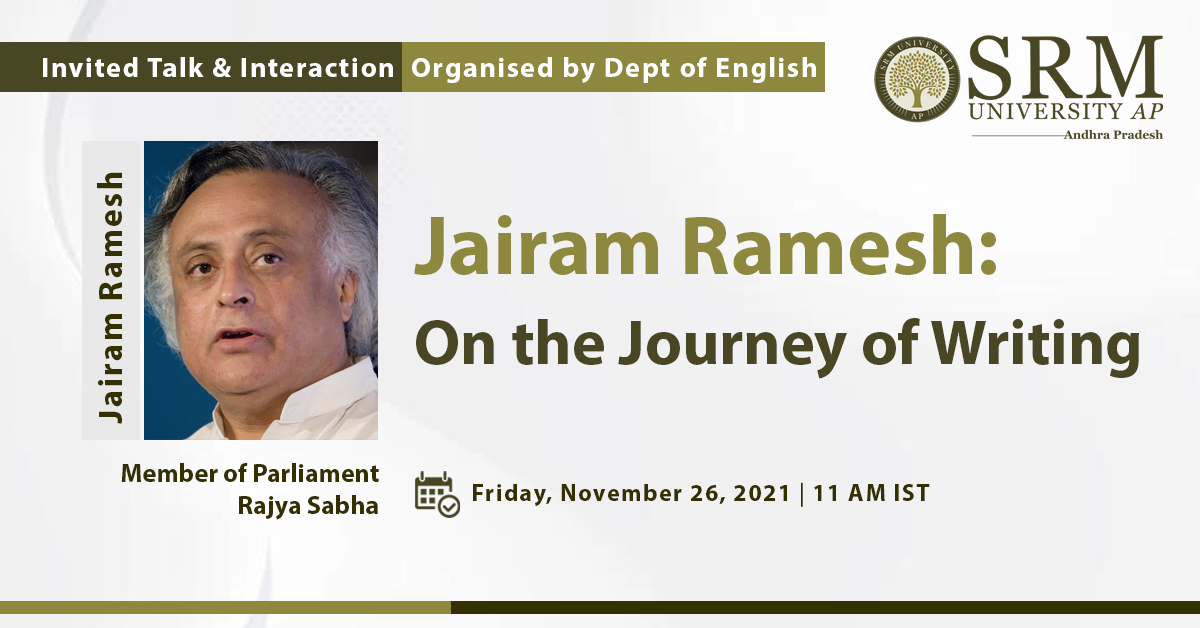Jairam Ramesh: On the journey of writing
 The Department of English at SRM University-AP invites you to an engaging webinar on November 26, 2021, at 11.00 am. Mr Jairam Ramesh, Member of Parliament representing the state of Andhra Pradesh, will be the guest speaker of the day.
The Department of English at SRM University-AP invites you to an engaging webinar on November 26, 2021, at 11.00 am. Mr Jairam Ramesh, Member of Parliament representing the state of Andhra Pradesh, will be the guest speaker of the day.
Writing is a process of pain and pleasure. Every writer approaches, experiences, and survives it in a unique way. In this talk and interaction, Mr Jairam Ramesh would share his idea and process of writing. His talk would be followed by an interaction about his latest book The Light of Asia: The Poem That Defined The Buddha (Penguin, 2021). The talk is intended to be a part of the Department’s larger initiative to organise interactions around “Language and Society” to address all kinds of conversations about language, communication, writing, speaking, thinking, and at a deeper level, about connecting with others.
About the Speaker:
Jairam Ramesh is presently a Member of Parliament and Chairman of Parliament’s Standing Committee on Science and Technology, Environment, Forests and Climate Change. He was Union Minister between 2006 and 2014 and held several portfolios including Commerce, Power, Environment and Forests, Drinking Water and Sanitation and Rural Development. He played a key role in global climate change negotiations in 2009 and 2010. He is also the author of several well-known books some of which are Green Signals: Ecology, Growth and Democracy in India, Old History, New Geography: Bifurcating Andhra Pradesh, To the Brink and Back: India’s 1991 Story, Indira Gandhi: A Life in Nature, Intertwined Lives: PN Haksar and Indira Gandhi, A Chequered Brilliance: The Many Lives of V.K. Krishna Menon and The Light of Asia: The Poem that defined the Buddha.
We encourage you to make use of this exclusive opportunity to interact with Mr Jairam Ramesh and understand the nuances of the writing process on November 26, 2021, at 11.00 am.
- Published in Departmental Events, English, English Current Happenings, Events, Webinars
Top 5% most cited author: Royal Society of Chemistry
 SRM University-AP could not be more proud to announce that Dr S Mannathan, Head of Department of Chemistry has made it to the top 5% in the list of the Most Cited Authors by the Royal Society of Chemistry. It is inspiring to have a faculty member in our midst whose work has helped and facilitated the research of so many others.
SRM University-AP could not be more proud to announce that Dr S Mannathan, Head of Department of Chemistry has made it to the top 5% in the list of the Most Cited Authors by the Royal Society of Chemistry. It is inspiring to have a faculty member in our midst whose work has helped and facilitated the research of so many others.
Dr Mannathan obtained his doctorate from National Tsing Hua University, Taiwan. His research interests primarily lie in Metal-catalyzed organic transformation reactions, Multicomponent reactions, and Asymmetric synthesis. His research followed by scientists all over the world leading him to become one of the top 5% authors in terms of citations
In the field of Transition Metal Complexes as Catalysts in Organic Reactions, he particularly leans towards ‘Nickel-and cobalt-catalyzed three-component coupling and reductive coupling reactions’, and ‘Palladium-catalyzed reductive arylation’. Similarly, in Asymmetric Synthesis, he favours research into ‘Asymmetric reductive Heck reaction for the synthesis of chiral indanones’, and ‘Synthesis of bicyclic tertiary alcohols and its related asymmetric version via reductive [3+2] cycloaddition reaction by using chiral cobalt complexes.’
About the top 5% most cited paper:
In this work, he reported the synthesis and application of a Zn-Bp-BTC MOF (Bp – 4,4′-bipyridine; BTC – 1,3,5-benzene tricarboxylic acid; MOF – metal organic framework) as a heterogeneous catalyst for mediating organic reactions. Initial reaction conditions were optimized for the Knoevenagel condensation reaction using Zn-Bp-BTC as a heterogeneous catalyst. Various factors such as the effect of solvent, temperature and catalyst loading were evaluated. Although the reaction proceeded at room temperature using methanol as the solvent, 60 °C offered the best yield in a shorter duration. Under optimized reaction conditions, a wide range of α,β-unsaturated dicyano compounds were prepared from the corresponding carbonyl precursor and malononitrile, the active methylene counterpart. A systematic investigation was also carried out to assess the role of the ligand and metal salt in the Knoevenagel condensation reaction. It was found that the Zn-Bp-BTC MOF catalyzed the reaction efficiently in comparison to its analogue Zn-BTC MOF and precursor Zn(NO 3 ) 2 ·6H 2 O. Finally, catalytic recycling and stability studies showed that the catalyst is able to mediate the reaction for up to five consecutive cycles without undergoing any significant chemical or morphological changes. Further, the catalyst was tested for its efficacy in a multicomponent reaction (MCR). An MCR with the Zn-Bp-BTC MOF as the catalyst afforded good yields and there was no reaction in the absence of the catalyst. Similarly, the catalyst was tested for its efficiency in benzimidazole synthesis.
Dr Mannathan did this research in collaboration with Dr. Kathiresan Murugavel, Scientist, Electro Organic Division, CSIR-Central Electrochemical Research Institute (Govt of India), Karaikudi.
- Published in Chemistry-news, Departmental News, News, Research News

